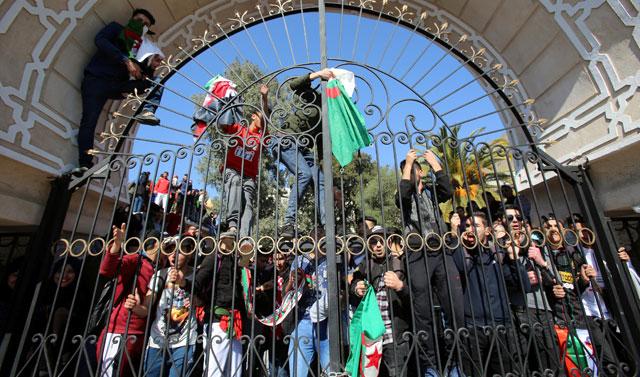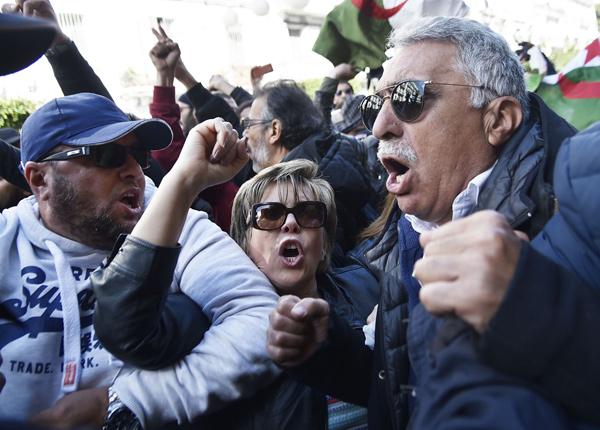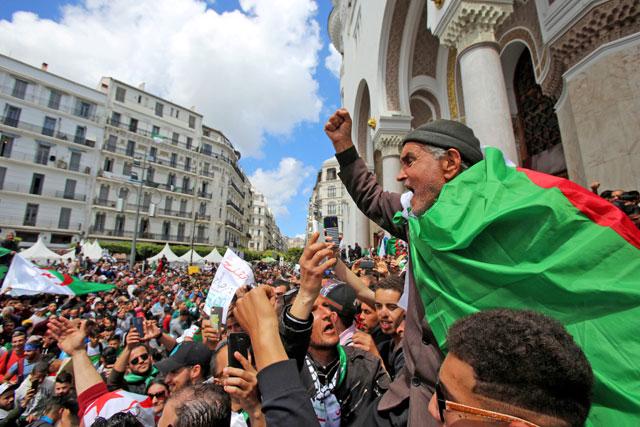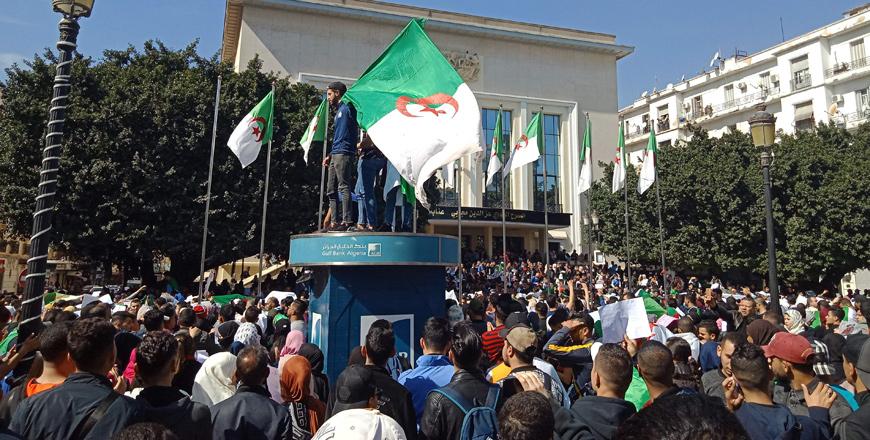You are here
Algerian protests swell on day Bouteflika declares reelection bid
By Reuters - Mar 03,2019 - Last updated at Mar 03,2019

Students protest against Abdelaziz Bouteflika's plan to extend his 20-year rule by seeking a fifth term in April elections, at a university, in Algiers, Algeria, on Sunday (Reuters photo)
ALGIERS — Algerian President Abdelaziz Bouteflika has submitted official papers confirming he will seek re-election, Ennahar TV said on Sunday, despite mass protests against the move.
There was no official confirmation, but state news agency APS published his asset declaration, which is a formal requirement to run in the election.
Tens of thousands of protesters had been rallying throughout the day in cities around Algeria to call for Bouteflika to step down. Numbers were approaching the levels of Friday when demonstrators filled the centre of the capital Algiers in one of the biggest outpourings of dissent — rare in Algeria — since the 2011 Arab Spring uprisings.
Bouteflika, 82, in shaky health for years, submitted his official election papers at the constitutional council in Algiers on Sunday, the private TV channel said.
He did not have to do so in person, state news agency APS had said earlier. Bouteflika, rarely seen in public since he suffered a stroke in 2013, was still in Switzerland for unspecified medical checks at the weekend, Swiss media reported.
A Reuters witness said trucks from Bouteflika's campaign arrived at the constitutional council on Sunday afternoon.
Opponents of Bouteflika say he is no longer fit to lead, citing his poor health and what they call chronic corruption and a lack of economic reforms to tackle high unemployment that exceeds 25 per cent among people under the age of 30.
Analysts say the protesters, who began hitting the streets 10 days ago, lack leadership and organisation in a country still dominated by veterans, like Bouteflika, of the 1954-62 independence war against France.
But traditionally weak and divided opposition and civic groups have called for protests to go on should Bouteflika, in power for 20 years, continue pursuit of reelection.
The government has played on fears among many Algerians of a return of bloodshed seen in the 1990s when an estimated 200,000 people were killed after Islamists took up arms when the military cancelled elections they were poised to win.
But the new series of protests have been generally peaceful, apart from Friday, when scuffles with police left 183 injured.
Thousands of students gathered on Sunday at university faculties, one of them near the constitutional council where presidential candidates filed their papers, chanting: "No to a fifth term!" or "A free and democratic Algeria!"
There was heavy security around the constitutional council, and police prevented restive students from leaving the campus nearby, keeping the main gates shut.
But thousands were later marching through the centre, like on Friday. A diplomatic source estimated as many as 70,000 people had amassed in Algiers, including a rally at Bab Ezzouar University, the country's biggest.
"We will not stop until we get rid of this system," said Aicha, a 23-year-old student.
More protests
around the country
According to witnesses and local television footage, protesters also turned out in their thousands in other cities around the north African country, such as Oran, Constantine, Annaba, Batna, Blida, Skikda and Bouira.
The first candidate to submit his papers was Ali Ghediri, a retired general who is taking on the elite of military, ruling FLN party and business leaders. "I tell the people a new dawn has started," he told reporters.
Another candidate, Rachid Nakkaz, a businessman and activist, arrived in a taxi and said: "We should remain peaceful to give a good image of our democracy."
By the afternoon, seven candidates had registered.
Opposition groups failed to agree on one candidate, making any campaign a tough uphill challenge in a country dominated by one party — the FLN — since independence.
Bouteflika changed his campaign manager on Saturday, state media said. He has not addressed the protests against him — the largest since 2011, when popular revolts ousted long entrenched elites in a number of Arab countries.
Many Algerians eschewed public political activity for years, for fear of trouble from the pervasive security apparatus or out of disillusionment with the lack of change in the leadership.
After the decade-long Islamist insurgency that Bouteflika crushed early in his rule, Algerians generally tolerated a political system leaving little room for dissent as a price to pay for relative peace and stability.
Related Articles
ALGIERS — Algerian police fired tear gas to disperse hundreds of demonstrators on a third straight day of rare political protests again
ALGIERS — Algeria’s army chief said on Monday he expects to see members of the ruling elite prosecuted for corruption and will support
By Lamine ChikhiALGIERS — Algerian war veterans said that protesters demanding ailing President Abdelaziz Bouteflika step down after 2














